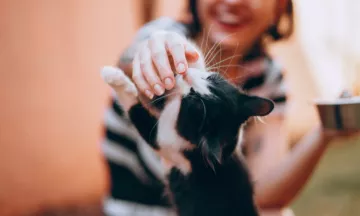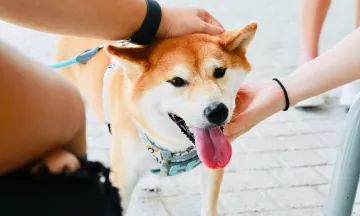If a new pet comes into your life or if a dog comes to visit you, it's smart to puppy-proof your house. Dogs tend to be a bit messy, they like to chew your stuff or scratch doors, or sometimes they can have a little 'accident' on your new rug. In addition, it is in the interests of both the dog and you to have set the house rules clear before the arrival of the pet. Here's what you can do to prepare yourself and your house for a dog.
Preparing your home for a dog is important for two reasons: first of all for the safety of the dog itself, secondly for the protection of your belongings. Also, if you are a dog sitter, keep in mind that pets can make a mess of your house and that safety for your guest pet is priority #1.

To avoid any risks as much as you can, it's smart to make your house dog-proof. Think about stuff like:
- Door & stair gates to regulate room access
- Store electrical cords and outlets
- Clean up your place properly, hide all shoes, store small items
- Bring fragile stuff and valuables to safety
- Keep toxic plants out of reach
- Close doors of cabinets and washing machines (for cats)
- Make sure that the trash can is out of reach
- Store toxic cleaning solutions, medicines, batteries etc
- Remove expensive rugs
- Buy some ecological detergent + wipes / tissues
- Provide a bench (for dogs)
Leaving the dog alone
Often damage occurs when we leave the dog unattended. In addition, when a dog is alone he can feel stressed, causing coping behaviour such as barking, scratching doors, chewing the bench or your brand new shoes.
If you are welcoming a guest dog into your home as a dog sitter, keep in mind that the dog may feel uncomfortable in this new environment. Suppose a dog can normally be home alone for 4 hours without any problems. It may very well be that when the dog is at a new place, he can't even be alone for 5 minutes without feeling uncomfortable and lonely. At that moment, he can show problem behaviour or stress signals: annoying the neighbours by barking, or ruining your stuff. Many dogs feel more comfortable in a crate or cage when they are alone. Also, a bench prevents your dog from turning your house upside down when you're not home. However, crate training does take time and effort. Is your dog not used to staying in a crate? Then don't leave him alone in a crate when he's at the dog sitters home either.
Is your dog going to stay with a pet sitter? Start with a test-day first. Then you can all experience how the dog actually behaves in a new environment. Read all about how much time you need for a dog as a pet owner and a pet sitter here.
House rules: what is allowed at your place?
Clear house rules are important for the safety of the dog and they give the dog guidance and peace of mind. Of course, rules are also good for you: through proper training, you can teach your dog to handle your belongings carefully and to be friendly with room mates or visitors and other pets.
Before the dog arrives at your place, decide what your rules are. Think of stuff like:
- Which areas of your house are accessible for the dog?
- Can the dog use your furniture? Is he allowed on your bed?
- Does he get snacks from you while you have dinner? How do you respond to begging behaviour?
- Where does he get his food? How do we reward the dog?
- Can the dog jump up to visitors?
Whether you take a dog in your home permanently or only temporarily as a guest pet: it is important that the dog feels comfortable with you. Moreover, rules are meant to make life more pleasant for both you and the dog. Remember that a dog just wants to be friends with you, and sometimes doesn't follow the rules because he simply does not understand or has yet to learn. So do not yell at a dog and or punish him. Reward the dog for good behaviour, and simply say 'no' when he shows undesirable behaviour and offer an alternative. For example: does the dog chew your shoe? Say 'no', take the shoe away. Put the dog on his bed or in his crate and give him a tasty chew snack
When it comes to house rules, it is important that you are consistent. This means that all family members must follow the same rules at all times. Are you welcoming a guest dog into your home? Then it is best to respect the rules and commands that the dog is used to at home as much as possible. Yet there is some room for change though. Can the dog stay on your couch at home, but not at the sitter's place? That doesn't have to be a problem. A dog can understand that in another environment, things run a little bit differently. Just keep in mind that the dog won't immediately understand what you want from him, so be nice and patient with him and forgive him any disobedience :-)
Taking your dog to the pet sitter
If you take your dog to a pet sitter, discuss the house rules with the sitter and share how your dog behaves normally. And be honest about that: can your dog sometimes be grumpy to children or other pets? Does he ever scratch doorposts of chew on your stuff? Does he like to jump happily on your bed with muddy paws? This is all very normal dog behaviour, but it is important that the sitter can prepare for this. Discuss it with each other: what are your agreements in case of damage to the property? If you have an open discussion about this kind of stuff, you will get a lot more enjoyment from having a dog board in your home. Because yes,pets can be a bit messy, but they also bring a lot of love and warmth into your home.





